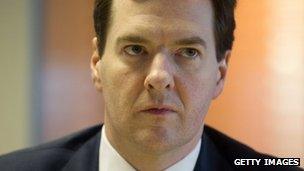MPs to debate and vote on form of Barclays inquiry
- Published

George Osborne said he would like to see Labour's Ed Balls appearing in the dock
There will be a debate and two Commons votes on Thursday after a row about the type of inquiry to be held into the Barclays Bank rate-rigging scandal.
MPs will vote whether to hold a judge-led inquiry, favoured by Labour, or a parliamentary one, favoured by government ministers.
Commons leader Sir George Young said the votes would take place at 5.15pm.
Earlier, Chancellor George Osborne urged Labour "to see sense", arguing a judge-led inquiry would take too long.
Ahead of the Commons debate, the House of Lords rejected a Labour amendment to the Financial Services Bill, suggesting the banking probe should be run by a judge - as is currently happening in the Leveson Inquiry into media standards - and be independent of Parliament.
Peers voted by 251 votes to 197 against the amendment, a government majority of 54.
Last week, regulators in the US and UK fined Barclays £290m for attempting to rig Libor and Euribor, the interest rates at which banks lend to each other and which underpin trillions of pounds worth of financial transactions, during the middle and end of the last decade.
'Seize the moment'
The bank's chief executive Bob Diamond has resigned with immediate effect after Labour and others called on him to do so.
In the Commons, Sir George laid out the choices facing MPs on Thursday, saying: "[We will] put two alternatives before the House: the inquiry that has been proposed by the opposition and the joint committee that has been proposed by the government."
But Mr Osborne told BBC Radio 4's Today programme that the UK was already "leading the world" in improving the working of banks by introducing the Financial Services Bill - which will ring-fence banks' retail and investment operations - and that the government was "in the process of sweeping away the failed system of regulation".
He said: "If Labour lose the vote today, as they probably will, they should see sense and support the bill."
The parliamentary inquiry would produce findings "over the next few months, instead of waiting for a decade after the scandal itself to get some answers".
The chancellor also said that, as Labour had been in power when the interest rate-fixing had gone on, its former ministers would be "the most afraid", adding: "No-one more than me would like to see [shadow chancellor] Ed Balls in the dock."
But Labour leader Ed Miliband said of Prime Minister David Cameron: "If he doesn't order that judge-led inquiry, I think he will be failing to understand both the gravity and scale of the crisis."
He added "We've got to seize the moment... the last thing the public want is a sense that the establishment is trying to cover it up and sweep it under the carpet."
Meanwhile, the senior Conservative MP chosen to lead the parliamentary inquiry, Treasury Committee chairman Andrew Tyrie, has indicated that he might rule himself out of the job.
He told the BBC he would not be prepared to continue without "the support of the whole House of Commons", adding: "I am certainly not going to want to run an inquiry that is in any sense partisan or perceived to be partisan. I would not be prepared to participate if that were the case."
The inquiry will look at the standards, conflicts of interest and culture in the banking industry.
The Serious Fraud Office is also considering whether to bring criminal charges, while Barclays has said it will conduct its own "root and branch review".